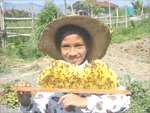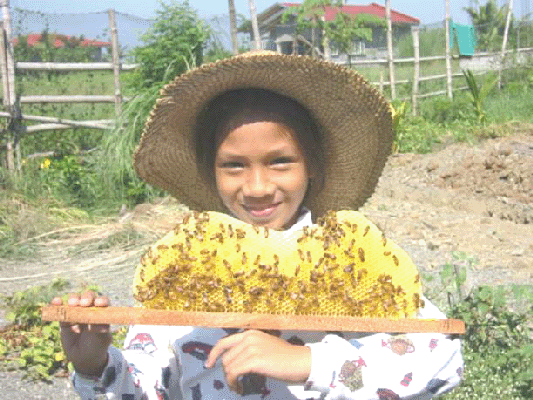|
|
|
|
|
|
|
|
|
|
|
|
|
|
|
|
|
|
|
|
|

|
|
| 05 March
2003: Sarrah Sinead, 7 years, holds a comb of honey for a souvenir photo. Photo
by Rene Quinquito |
|
|
|
|
|
|
14 September 2004
Unedited format published by the BusinessworldBeekeeping industry off from a bad start
Photo / Story by: Rene Icasiano-Quinquito
Attn: Eds Mandatory Credits Apply
|
|
|
|
|
|

|
|
|
Sarrah Sinead, 7 years old, holds a honeycomb for a souvernir
photo at Sara's Honeybee, Daang Baka, Maysantol, Cupang Bulacan, Bulacan |
|
|
|
|
|
Bulacan, Bulacan, 14September2004: With renewed interest on a program that has been
shunned by former President Ferdinand Marcos, failed by local government units and NGO
groups, gained minor popularity in the 1950’s as a hobby, in the Philippines
beekeeping or apiculture is making a comeback.
Further difficulties were compounded by a republic act
(RA 9151) handing over the whole industry to an institution rumored to have received a
multimillion-peso budget spent on travel expenses and expensive four-wheel drives.
And threatened with government's desperate search for income
generation to resolve its financial crisis by fast-tracking small and medium scale
business through economic templates or "road maps" isn't doing the industry the
support it requires.
Still, keeping bees is a
fascinating and desirable pursuit for it has survived since the early recordings of the
Vedas in India, heralded in the Koran of Mohammed and the Holy Bible of Christianity.
Equally it attracted the attention of Greek mythology, of Pliny
and Aristotle and on down to the more modern investigations of Huber and Fabre.
Many bee enthusiasts start with only a few beehives in their
backyard as a hobby.
I started out on beekeeping or "apiculture" some 5
years ago with a research work that saw a potential solution to the country's agricultural
production problem.
EUROPEAN HONEYBEE
The course of my research furthered my conviction after realizing
that most self-sufficient countries are using bees specifically Apis Mellifera” or
the European Honeybee as the foundation for the remarkable performance of their
agricultural programs.
Beekeeping companies engaged farmers owning vast
agricultural areas or orchards for "pollination services" using honeybees to
achieve the process of sexual reproduction in plants.
Pollinating crops or contract pollination, is big business
in the United States of America, Australia, Canada and Europe.
But early in the Philippines, the dispersal of beekeeping in the
countryside failed to sustain the interest in the majority of the recipients for they had
expected quick financial returns out of their investments in bees and equipment,
miscalculating its value in agriculture.
Beekeeping using the European Honeybee is an import-dependent
business – the insect is imported.
Research and dissemination program in the keeping of local
indigenous bees or “Apis Cerana” is relatively a new endeavor such that related
problems have not yet been identified.
In-spite of all these obstacles and set backs, the local
beekeeping industry is struggling forward with the creation and convergence of
associations and groups striving towards identifying, understanding and resolving problems
for it to mature.
Products derived from the honeybee have enormous potentials
especially with government and institutional support, headed by the Department of
Agriculture, Bureau of Plant Industry, the University of the Philippines in Los Banos,
Laguna and the National Apiculture Research and Development Institute or NARTDI.
But the main driving factor is the vigilance of the people in
developing the industry. |
|
|
|
|
|
About
the author:
Mr. Rene Marcos Icasiano-Quinquito is an Apiculturist of Sara’s Honeybee and an
18-year veteran in information systems and telecommunication as a Technical Manager of the
Agence France-Presse, was also the elected President of the BEENET Foundation Philippines
Inc. in 2004 for both its National and Luzon Chapters.
He founded the Sariling Talino At Gawa Movement that advocates increased agricultural
production through sustainable agricultural practices.
|
|
|
|
|
|
Send us an email, link-up,
and recieve our free newsletter.
Mabuhay po kayo!
Rene Quinquito
Anchorman - Radyo Aralan 87.9FM Bulacan
Founder - STAG Movement
CellPhone Number (+63918) 356-3831 |
|
|